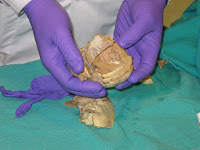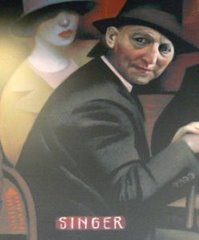Every family has its recurring and unchanging stories about its members, the shorthand for summing up who’s who and why they behave the way they do. My mom is a master at that, and honestly, it drove me crazy while I was growing up. I felt trapped by her version of me and of everyone else.
For example, my dad was a Marine who served in WWII and then worked for the Marine Corps after returning from overseas. His “Marineness” came to be the explanation for so much of his behavior: Dad’s insistence that dinner be on the table at 5:30 sharp. His politics during the Viet Nam War. The way he didn’t really have conversations with his children, but barked out opinions and interrogated. What I saw as his stubbornness and rigidity, my mother explained as “He was a Marine.” What I saw as bordering on obsessive-compulsive disorder, she admired as “his Marine training. He likes things precise.” It was enough to make a teenager scream, which I frequently did.
Semper Fi my foot!
Even though I heard “He was a Marine” ad nauseum, I really never heard any of the details of his time in the service. It wasn’t that dad didn’t like telling stories. With the slightest prompt, he would go on about his boyhood growing up in South Philly, the crazy stunts he pulled, the way he did anything to make a buck to help support a sister and single mother (Dad was a rarity of the time; a child of divorce).
But when it came to the war, I don’t recall him ever going into any details. For a long time, I figured it was me, that in my snotty judgmental way, I tuned him out, or that he suspected that I didn’t want to hear, so he stayed silent on the subject. But even my mom admitted that he didn’t talk much about the war, and that it was out of character for him to be so reticent about an experience that clearly shaped and defined him half a century later.
It wasn’t until I was an adult that I heard vague mention of his heroism as a member of the famous 5th division at Iwo Jima. It wasn’t until this latest trip home for his funeral that I came across dad’s scrapbook of his Marine years and took the time to go through it. There are photos

from Japan and China and the Islands. A handsome, unbearably young soldier smiling with my dad’s distinctive underbite. This same soldier with his arms looped around a fellow soldier. Holding a weapon. Arms playfully around a Japanese woman.
There were also copies of several articles, including a long, detailed one written by a Marine Corps combat correspondent. In the Philadelphia Inquirer appeared the following brief article headlined
Courage in that straight-forward, enthusiastic 1940s newspaper style:
Pfc. Gilbert Wolfson, 268 S. 5th St., was one of a group of volunteer  litter-bearers whose courage resulted in the rescue of 28 wounded Marines on Iwo Jima. The Marines had been isolated almost three days and nights in an enemy dominated pocket.
litter-bearers whose courage resulted in the rescue of 28 wounded Marines on Iwo Jima. The Marines had been isolated almost three days and nights in an enemy dominated pocket.
More than 40 Marines had been killed or wounded in unsuccessful attempts to rescue the 28 men. The wounded had been without food, water, or medical attention. They lay under a constant cover of Jap fire, unable even to sit up. One very accurate Jap sniper hidden in a maze of caves used the wounded as a lure, and is credited with hitting 15 Marines and Navy medical corpsmen
Shortly before dusk on the third night, the volunteer stretcher-bearers moved out beyond the front, and crouching low, ran across the open stretches. The rescue work was doubly difficult, for the wounded were spread out over a large area, making it impossible to provide protective fire for the litter bearers.
By 8:30 that night they walked back through the lines. They had succeeded in evacuating the 28 wounded, nine of whom were in serious condition.
This story doesn’t mesh with the dad who raised me. As a snotty, know-it-all teenager and young adult, I so often criticized him for being so tame, so 9-to-5, so unadventurous, and so fearful of upsetting the status-quo blue collar life that he went on to establish with my mother --the life of 55 years in the same marriage and same house, the life of eating in the same restaurants and working at the same job and vacationing in the same spot decade after decade.
So, who was this fearless guy of Iwo Jima? Who was this dashing, wild, reckless hero who defied the odds of war and lived long enough to return to Philadelphia, to meet my mom, to marry, to become the only dad I ever had?
I’m so glad to have this new puzzle to puzzle over, to keep me from smugly thinking that I really know who’s who and why they behave the way they do.



 Only a month or so ago, this fancy perfumed showgirl looked brown and withered in the pot on my deck. Look at her now.
Only a month or so ago, this fancy perfumed showgirl looked brown and withered in the pot on my deck. Look at her now.




























